
учебник 3 курс ICT
.pdf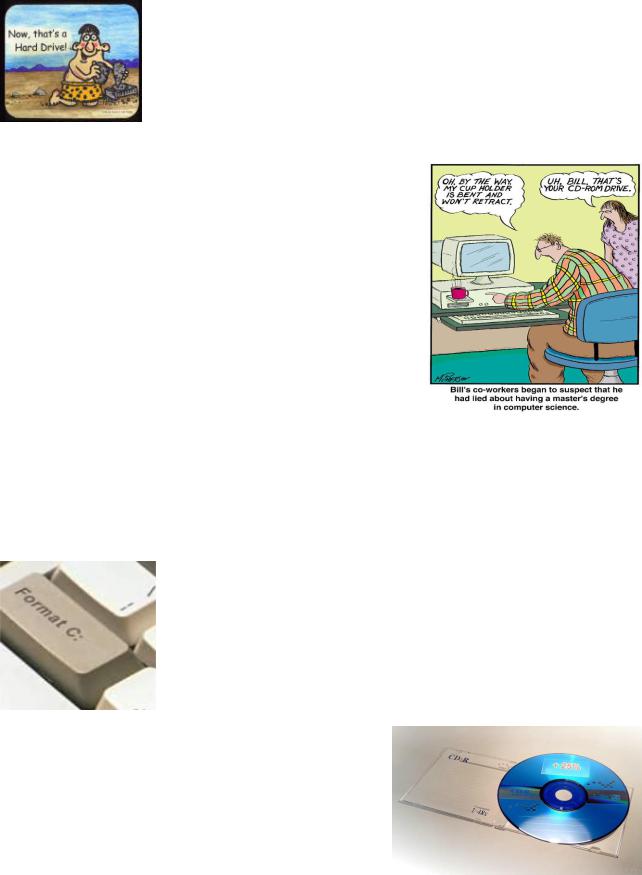
DATA STORAGE
COMPUTER TERMS
CD-ROM - Consumer Device, Rendered Obsolete in Months
DISK - What goes out in your back after bending over a computer keyboard for seven hours at a clip.
FLOPPY - The condition of a constant computer user's stomach due to lack of exercise and a steady diet of junk food (see Chips).
FLOPPY - The state of your wallet after purchasing a computer.
MEMORY - Of computer components, the most generous in terms of variety, and the skimpiest in terms of quantity.
Random Access Memory - When you can't remember how much you spent on the new dress when husband asks about it FILE - A document that has been saved with an unidentifiable name. It helps to think of a file as something stored in a file cabinet - except when you try to remove the file, the cabinet gives you an electric shock and tells you the file format is unknown.
Tech Support: "How much free space do you have on your hard drive?"
Customer: "Well, my wife likes to get up there on that Internet, and she downloaded ten hours of free space. Is that enough?"
Student: ―I forgot to make a backup copy of my brain, so everything I learned last semester was lost.‖
A customer was asked to send a copy of her defective diskettes. A few days later a letter arrived from the customer along with photocopies of the floppies.
A technician advised his customer to put his troubled floppy back in the drive and close the door. The customer asked the tech "hold on", and was heard putting the phone down, getting up and crossing the room to close the door to his room.A technician received a call from a man complaining that the system wouldn't read word
131

processing |
files |
from his |
old (5-1/4") diskettes. After trouble-shooting for magnets and heat failed |
to diagnose |
the |
problem, |
it was found that the customer had labeled the diskettes, then rolled them |
into the typewriter to type the labels.
MURPHY‘S COMPUTER LAWS
No matter how many resources you have, it is never enough.
Any cool program always requires more memory than you have.
Any given program will expand to fill all the available memory.
When you finally buy enough memory, you will not have enough disk space.
Disks are always full. It is futile to try to get more disk space. Data expands to fill any void.
If a program actually fits in memory and has
enough disk space, it is guaranteed to crash.
When putting something into memory, always remember where you put it.
No matter how big a hard drive you buy,
you'll need to double it in a year.
A 'debugged' program that crashes will wipe out source files on storage devices when there is the least available backup.
He who laughs last, probably has a back-up.
132
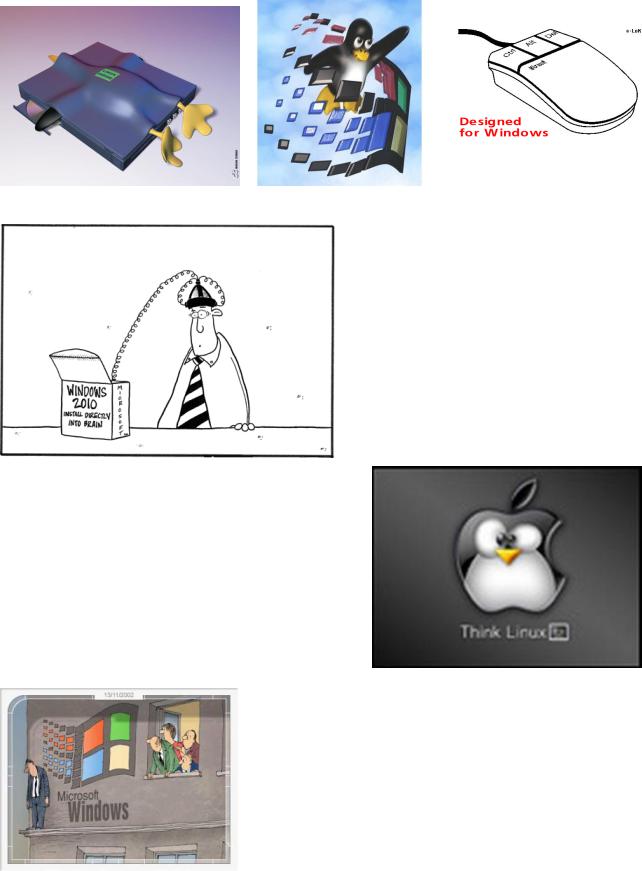
OPERATING SYSTEMS
A customer comes into the computer store. "I'm looking for a mystery Adventure Game with lots of graphics. You know, something really challenging."
"Well," replied the clerk, "Have you tried Windows?"
If Bill Gates had a dime for every time a Windows box crashed... Oh, wait a minute, he already does.
Millions of people believe they are animals, but I have yet to meet one that believes in Windows' stability. Even human stupidity has limits ;-)
No matter what problem you have with your computer - Its
Always Microsoft's fault
System Update: A quick method of trashing ALL of your software.
133
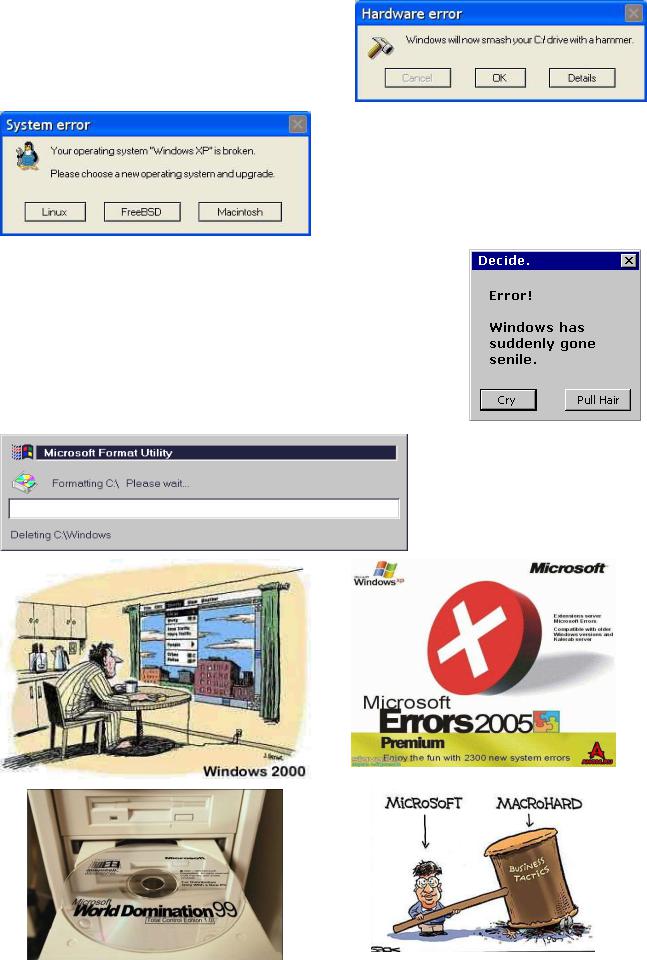
ERROR MESSAGES FOR WINDOWS
*User Error: Replace user.
*Windows VirusScan 1.0 - "Windows found: Remove it? (Y/N)"
*File not found. Should I fake it? (Y/N)
*Error reading FAT record: Try the SKINNY one? (Y/N)
*Press any key to continue or any other key to quit.
*Press any key except... no, No, NO, NOT THAT ONE!
*Press Ctrl-Alt-Del now for IQ test.
*Close your eyes and press escape three times.
* Bad command or file name! Go stand in the corner.
* This will end your Windows session. Do you want to play another game?
134
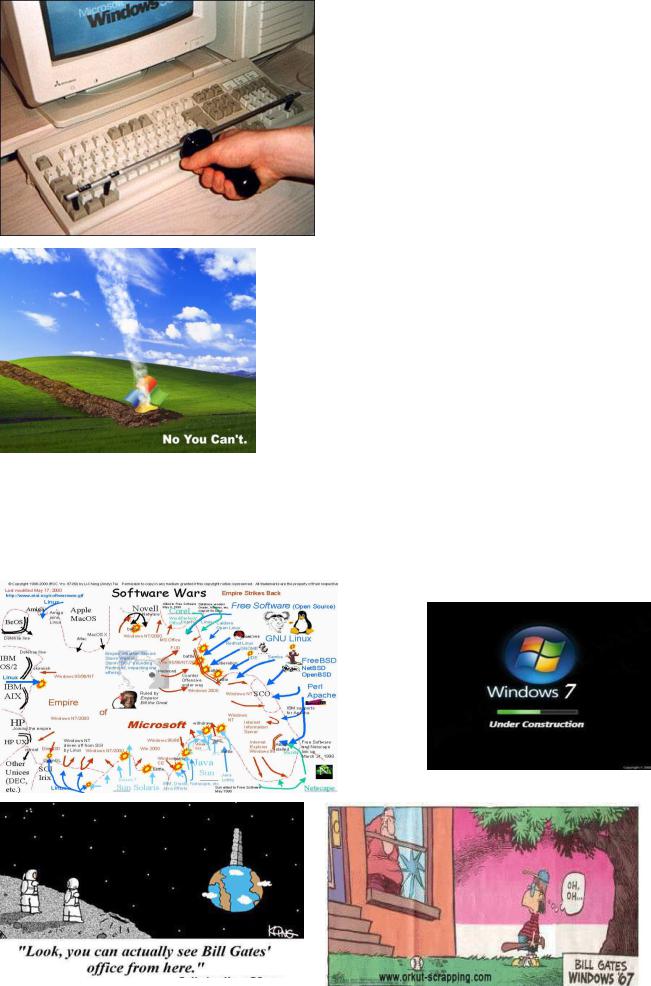
WINDOWS A VIRUS?
No, Windows is not a virus. Here's what viruses do:
They replicate quickly. (Okay, Windows does that)
Viruses use up valuable system resources, slowing down the system as they do so. (Okay, Windows does that)
Viruses will, from time to time, trash your hard disk.
(Okay, Windows does that, too)
Viruses are usually carried, unknown to the user, along with valuable programs and systems. (Sigh... Windows does that, too)
Viruses will occasionally make the user suspect their system is too slow and the user will buy new hardware. (Yup, that's with Windows, too)
Until now it seems, Windows is a virus but there are fundamental differences: Viruses are well supported by their authors, are running on most systems, their program code is fast, compact and efficient and they tend to become more sophisticated as they mature. So, Windows is *not* a virus!
135
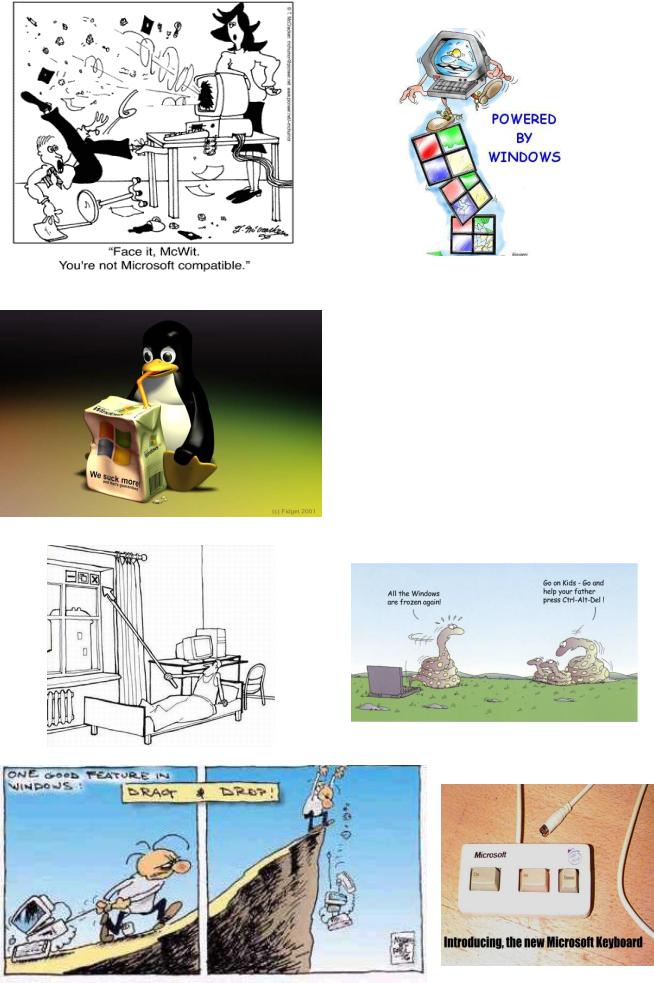
136
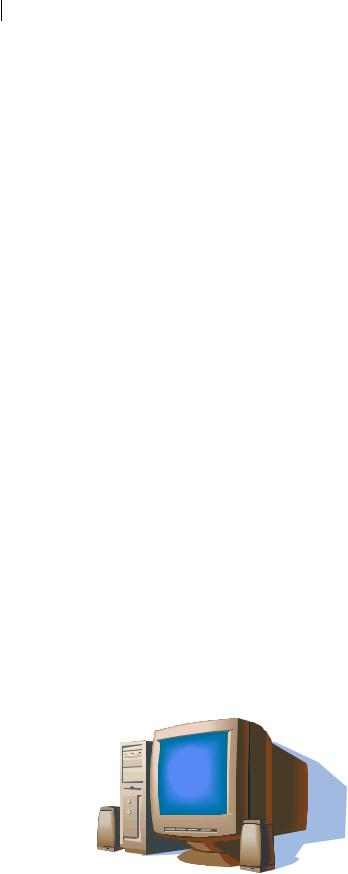
СПИСОК ИСПОЛЬЗОВАННОЙ ЛИТЕРАТУРЫ
1. Santiago Remacha Esteras, Elena Marco Fabre ―Professional English in use: ICT‖ / Cambridge: Cambridge University Press, 2007.
2.Santiago Remacha Esteras ―Infotech: English for computer users‖ / Cambridge: Cambridge University Press, 2006.
3.Paul S. Davies ―Information Technology‖ Oxford/Oxford University Press, 2008.
4.Keith Boeckner, P.Charles Brown ―Oxford English for Computing‖ Oxford/ Oxford
University Press, 2005.
5.David Riley, Liz Greasby ―Check your vocabulary for computing‖ UK/Peter Collin Publishing, 1999.
6.Лоскутова Г.В., Масленникова Ю.В. «О компьютере по английски»/СПб.:КАРО,2005.
7.Радовель В.А. «Английский язык: Основы компьютерной грамотности»/Ростов н/Д: Феникс, 2007.
8.Кожевникова Е.В. «English for Computing»/М.: Флинта: Наука,2007.
9.English for Computer Science Students/М.: Флинта: Наука, 2006.
10.Интернет-ресурсы: www.cambridge.org
www.wikipedia.org www.economist.com www.computerland.com www.computerhumour.com www.pctechguide.com www.pearsonlongman.com
137
